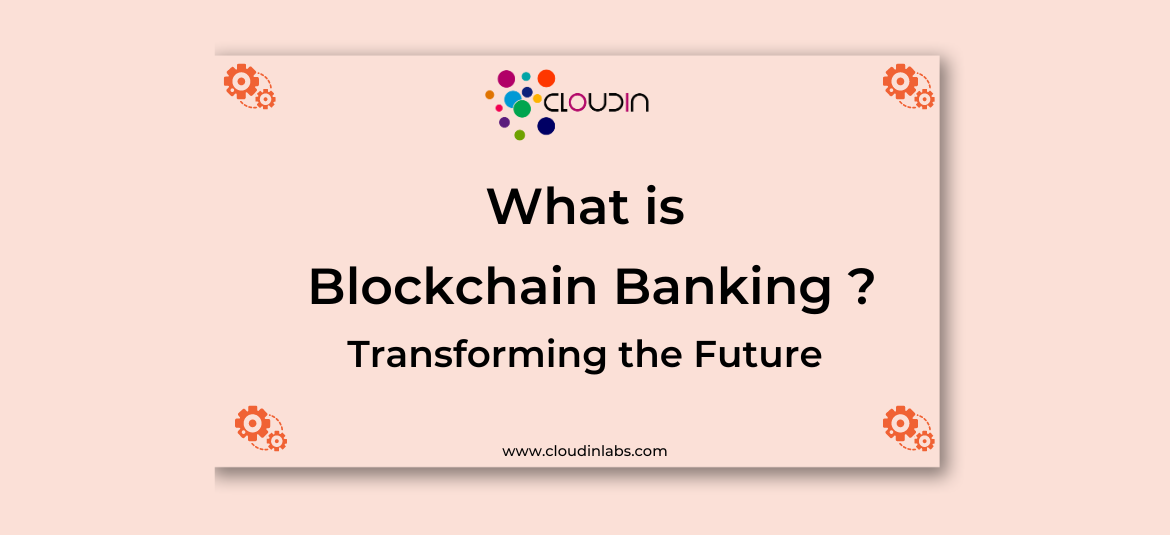Blockchain technology in the banking sector has transformed economic markets. Blockchain technology can eradicate the necessity for mediators and central authorities, such as banks, regulators, and clearing houses, and decrease the menaces of fraud, corruption, and human error. Blockchain technology can also increase the swiftness and precision of transactions and lower operational and transactional costs. Blockchain banking can improve the faith and confidence of customers and stakeholders and enrich the customer experience and contentment.
In recent years, the term “blockchain banking” has been making waves across the financial environment. But what exactly does it demand? How does it transform traditional banking systems? In this blog post, we will explore the details of blockchain banking, its definition, advantages, applications, and the underlying technology driving this financial paradigm shift.
What is blockchain banking?
Blockchain technology is an open, distributed ledger that registers transactions between two individuals proficiently and enduringly. A blockchain comprises individual blocks of data that include a sequence of associated transactions, connected in a particular order. All the concerned parties can share a digital ledger across a computer network without requiring a centralized authority or intercessors. That’s why processing transactions through the blockchain is quicker.
The swiftness is just one of the many potential advantages blockchain brings to banking. It’s not only about superior effectiveness but also a new level of clarity and safety. Blockchain banking, at its core, refers to the incorporation of blockchain technology into traditional banking structures. Unlike traditional banking systems that depend on centralized authorities to authenticate transactions and sustain ledgers, blockchain banking functions on a decentralized network of computers, known as nodes. These nodes jointly validate and record transactions in a transparent, secure, and undeniable manner, eradicating the need for intermediaries such as banks or clearinghouses.
Blockchain banking transforms the financial sector by leveraging blockchain technology to ensure transparent, safe, and decentralized transactions. It eradicates the necessity for intercessors, streaming procedures, and augments trust in the banking system.
What are the advantages of blockchain in banking?
Blockchain is a distributed database that permits secure, transparent, and undisputable record-keeping. It is a decentralized system, meaning that it is not operated by any single entity, such as a bank or government. Instead, it depends on a network of computers to authenticate and record transactions. One of the main aspects of blockchain banking technology is that it uses cryptography to safeguard transactions. When a transaction is made, it is documented on a block, which is then included in the chain of earlier transactions, forming an unbroken record of all actions on the blockchain. Each block is connected to the previous block, making it tough to modify the record retrospectively.
Here are a few advantages of blockchain banking:
Increased security: Blockchain technology allows for secure, encrypted transactions without the necessity of a central authority.
Decentralized: Blockchain is decentralized, meaning that it is not operated by any single body. This permits increased clarity and fairness.
Increased efficiency: Traditional banking systems can be sluggish and clumsy, particularly when it comes to cross-border transactions. Blockchain technology allows for quicker, more effective transactions.
Reduced costs: The decentralized nature of blockchain technology decreases the requirement for intermediaries, which can considerably decrease costs.
Immutability: Once data has been documented on the blockchain, it cannot be modified, ensuring the honesty and accuracy of transactions.
Increased transparency: All transactions on the blockchain are evident to all parties, increasing transparency and faith.
Enhanced compliance: Blockchain technology can help banks abide by regulations by offering a tamper-proof record of all transactions.
Improved asset tracking: Blockchain can be used to follow the tenure and movement of assets, such as loans, in real-time.
Enhanced customer service: By using blockchain, banks can offer quicker, more effective facilities to their consumers.
New revenue streams: Blockchain technology can open up new income streams for banks by allowing the conception of new financial products and services.
How can blockchain be used in banking?
Blockchain technology has become progressively essential in the banking sector due to its capability to offer secure, transparent, and irreversible data. Blockchain implementation in banking offers an array of advantages for banking sectors, including higher operational proficiency, improved transparency, cost savings, and diminished fraud menace.
Here are a few use cases of how blockchain can be used in banking:
- Trade Finance
- Identity management
- Digital currency
- Cross-border payments
- Smart contracts
- Loan issuance
- Asset tracking
What exactly is blockchain technology?
Blockchain is a technique of documenting data that makes it challenging for the system to be altered, hacked, or manipulated. A blockchain is a circulated ledger that copies and allocates transactions across the network of computers partaking in the blockchain. Blockchain banking technology is a structure that saves transactional records, also known as the block, of the public in numerous databases, known as the “chain,” in a network linked through peer-to-peer nodes. Normally, this storage is stated as a ‘digital ledger.’
Each transaction in this record is approved by the digital signature of the proprietor, which validates the transaction and safeguards it from meddling. Therefore, the information the digital ledger contains is highly protected. In simpler words, the digital ledger is like a Google spreadsheet distributed among various computers in a network, in which transactional records are saved and established based on actual acquisitions. The captivating angle is that anyone can view the data, but they can’t damage it.
How are banks using blockchain?
Banks and financial institutions are dynamically discovering and employing blockchain solutions to modernize operations, reduce costs, and offer innovative financial services to consumers. From cross-border payments and trade finance to identity authentication and regulatory compliance, banks are harnessing blockchain technology to augment productivity, security, and the customer experience. For instance, J.P. Morgan Chase has developed Quorum, a blockchain-based platform for interbank payments and tokenized assets. Likewise, Ripple’s blockchain technology facilitates real-time cross-border payments for banks and payment providers worldwide.
What are the benefits of blockchain?
Blockchain is the pillar technology of the digital cryptocurrency Bitcoin. Blockchain technology is a digital or ledger technology that estimates records and makes a trail of them in a peer-to-peer network. Each transaction is tested by the majority of members of the system. It comprises every single record of each transaction.
Benefits of Blockchain Technology
The following are some of the benefits of blockchain technology:
- Efficiency
- Transparency
- Security
- Network distribution
- Traceability
- Reduced Costs
- Availability
- Automation
- Decentralized
- Tokenization
What is blockchain banking? Revolutionizing Finance
While blockchain was primarily intended to offer an alternative to traditional finance, it is now obtaining attention from the financial establishments with which it was meant to compete. After several years of modulating and ever-deriding the technology, banks are now understanding that the advantages of blockchain can no longer be overlooked.
Many applications of blockchain in banking offer ways to develop the sector’s existing operations and techniques. On the other hand, it is also likely that in the future, banks will be executing blockchain solutions planned to exist outside the traditional system. If that materializes, the blockchain challenge to the sector will have been fruitful.
Blockchain banking represents a monumental shift in the banking landscape, offering unprecedented security, efficiency, and transparency compared to traditional banking systems. By harnessing the power of blockchain technology, banks can unlock new opportunities for innovation, collaboration, and growth in the digital economy. As blockchain continues to disturb and transform the financial industry, the future of banking looks brighter than ever before. Get in touch with the best blockchain company in Coimbatore if you are planning to incorporate blockchain banking into your upcoming projects and be a part of the revolution.


